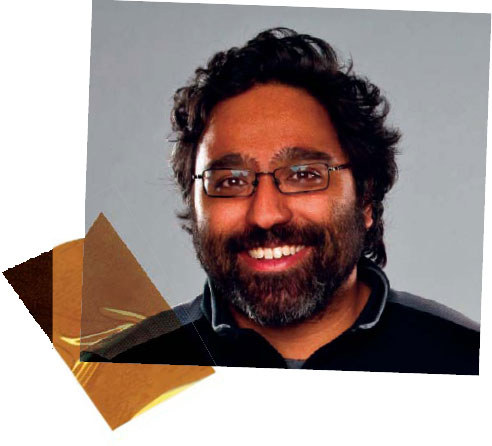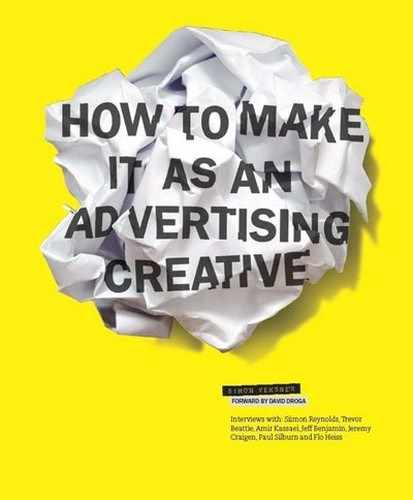
INTERACTIVE EXECUTIVE CREATIVE DIRECTOR CRISPIN PORTER + BOGUSKY, USA
Patience, passion, and persistence.
I debated competitively in college, so the most obvious thing to go into was law. But what I liked about being a lawyer was what I saw on television—being in front of people, being witty, funny, thinking quickly, persuading people, interacting with audiences. In real life that actually has nothing to do with law, and really had more in common with advertising. I think that’s why I enjoy my job so much. And that time in college debating helped mold me into the creative I am today.
When I interview young creatives I look for passion. That’s what got me as far as it did. It definitely wasn’t my portfolio. Because I realized so late that I wanted to go into advertising, my portfolio was made up of a bunch of brightly colored table tents for musical acts and modern dance groups. To this day I’m baffled as to how I got my first job—which was at a pretty good place. I like to think the passion I had and showed was worth taking a risk for. I think when you’re that passionate about something, you figure out how to make up for what you don’t have or haven’t learned yet.
I think when you’re young they are. As an industry, we create that mentality by rewarding creatives and agencies who have won awards. And when you’re young, it’s easy to get caught up in it all. But for me, there’s no greater reward than seeing something you worked on find its way into the culture. Early in my career, I was at a public library and just coincidentally saw this mom and her young son at a computer near me laughing over something that I had worked on. It’s amazing when you can feel like you matter or affect someone. And no lion or pencil can give you that.
It’s the most important thing. You could have the greatest idea, but unless you can communicate that idea, it will never see the light of day. Interactive ideas are more challenging because it’s often difficult for a client or even a creative director to imagine what you’re talking about. Frequently I find that people presenting interactive ideas don’t realize what is important about their idea. I would often find myself trying to explain the technology instead of the idea and it would leave people puzzled. When I started talking about the basic concept, the idea, or story first, it was something more people could relate to and get excited about.
It’s important to note, though, that while I think presenting interactive work has challenges because it can sometimes require some imagination, it shouldn’t be because the idea is complicated. There’s a tendency for interactive creatives to complicate their ideas under the belief that the more layers you add on to an idea the better it will be. But all you do is make it more complicated. The best ideas, even interactive ones, have always been simple.
For me, it was having a life. Agencies don’t really teach life skills. No one is going to tell you when to go home or that you should have some hobbies and a life outside of work. I found myself sort of in a martyr syndrome at the office at all hours and didn’t realize all those other things are necessary for a healthy career and help to inspire what happens at the office. I think I went into depression one year when I didn’t win some award. That’s when I realized there was a problem. For me, being an inventor is the best part. Probably most interactive creatives share that love. I think I was maybe a scientist in another life because I can’t help but want to make things that don’t exist. Solve problems that don’t have solutions. Be a pioneer. And then work with other people as a team to solve those things.

More and more, creatives are becoming multi-dimensional. Especially young ones. And really, at this point, if you’re a young creative, you have to be good at every medium if you want a job. If you’re someone who’s been in the industry for a while now, I think that time where you could hide behind nice print and TV has come to an end. And it’s because as an industry, we’ve realized that truly great ideas, the big ideas, are bigger than any one medium. And many times, invent mediums of their own.
The best time to make a move is when you feel like you’re running toward something great, and not running away from something bad. Too many times, creatives make ill-fated moves because they’re trying to get away from what they think is a bad situation. Whether they feel like they’re being held back or aren’t making enough money or hate the smell of their partner. You know you’re making a great decision when you can’t wait to start somewhere because of the amazing opportunity that awaits.
I go through life with the filter of interactive. I buy movies and music online. I’m a part of all the social networks; I twitter, I play video games even though I have no co-ordination, I try to experience everything you can possibly experience or do in the digital world. And as I’m experiencing those things and the everyday things that go on in my life—in the back of my mind, I’m thinking about what sort of creative idea that might inspire. If I have a problem or wish something existed that doesn’t, I wonder if other people might have that problem too, and whether a client we have could bring a solution to the world. It’s important to live in the mediums we work in because that’s the only way we’ll know if we’re creating the right solutions for our clients.
Remember to have fun and enjoy your career. We work in an industry that nurtures unrealistic dreams like wanting to be the youngest art director, then a creative director, making the most money, winning the most awards. And unfortunately, when you get caught up in that kind of thinking, you’re left unfulfilled and disappointed. It’s like going to an amazing restaurant and basically inhaling all the food. Eating so fast that you never enjoy the meal, but focus on getting the meal into your stomach before anyone else at the table does. Enjoy every moment of your career, learn everything you can, and remember that coming up with great ideas, making things, seeing people play with the stuff that you make—all of that is what you’ll remember in your career. And what you might be remembered for. Not how much you make, when you got a promotion, or that time you were on stage winning an award.

